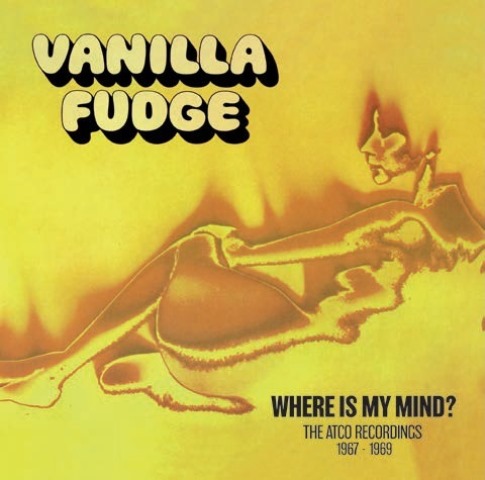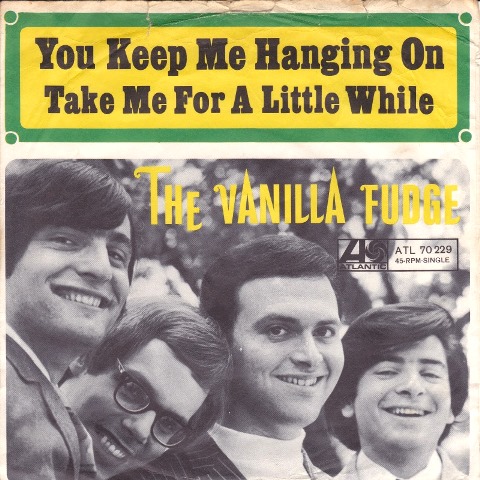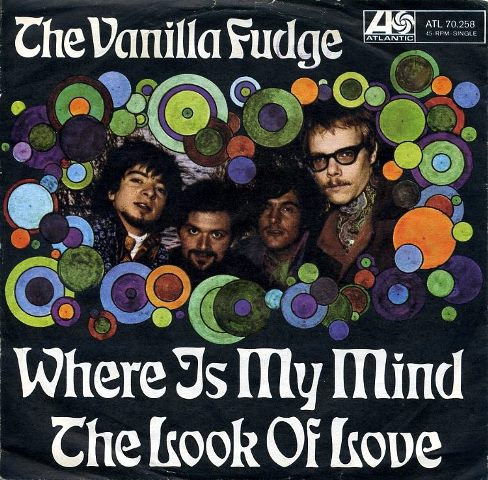Vanilla Fudge could provoke a strong reaction. Writing about them in 1982, Tom Hibbert – then best-known for his contributions to Smash Hits – said of their February 1968 second album, The Beat Goes On, that “on one side of the bombastic concept LP, Vanilla Fudge summed up the history of music from Mozart, through Cole Porter and Elvis, to The Beatles concluding that it was all worthless.”
“On the other side,” continued Hibbert. “Fudge unleash on the unwary listener their vision of the ‘now generation,’ in the form of a dull reworking of Sonny Bono’s ‘The Beat Goes on.’ This was the recurring [musical] theme through such treats as 'Voices in Time' (extracts from the recorded speeches of Churchill, Roosevelt, Kennedy with doom-laden musical accents from the Van) and later passages into which the boys’ own voices began to creep thuswise: 'the beat goes on… the mind goes on…the whirlwinds blow…the beat of life goes on ever changing….we hold only the tools through which to express time through music.'”
 Hibbert saw an innate ridiculousness in Vanilla Fudge’s music, their heavy, snail-slow versions of songs originally by (indeed) The Beatles, The Supremes, The Zombies and more. In their portentousness and pretentiousness too. And the punctuation of their arrangements with wave after wave of bludgeoning instrumental crescendos which pummel the listener as if they were being buffeted by a force-million gale. This was not a band of laid-back hippies. The petals of the psychedelic era's flowers were blasted off by Vanilla Fudge.
Hibbert saw an innate ridiculousness in Vanilla Fudge’s music, their heavy, snail-slow versions of songs originally by (indeed) The Beatles, The Supremes, The Zombies and more. In their portentousness and pretentiousness too. And the punctuation of their arrangements with wave after wave of bludgeoning instrumental crescendos which pummel the listener as if they were being buffeted by a force-million gale. This was not a band of laid-back hippies. The petals of the psychedelic era's flowers were blasted off by Vanilla Fudge.
Back in September 1967, reviewing their eponymous debut album in Record Mirror, Norman Jopling noted “To grasp what the Vanilla Fudge are doing on record isn't really possible when you listen to their 'You Keep me Hanging on' single. For one thing the single is a very cut-down version of the number on the LP. I listened to their Vanilla Fudge album on the American ATCO label and came to a few conclusions. Firstly, they are attempting something which is highly original and in the case of their album something which mainly succeeds. But of course it all depends whether you personally LIKE what they are doing. You could quite easily have rushed out and bought their hit single, and although the same basic techniques are employed on the LP, you might well hate the album.”
“It seems to me that their style,” continued the ever-reliable Jopling. “Is to take a pop or soul tune, one which is well-known in most circles and distort it from the original concept of that tune, using pop improvisation in a way that many jazz musicians have been doing since jazz began. The drawback is that pop, unlike jazz, is limited in style – obviously since pop and jazz are styles of music, and not specific sounds. Therefore the Fudge use the same technique on most of these tracks – the slowing down of the original tune, the heavy organ-based soul backing and the clever improvisation and/or gimmickry (where do you draw the dividing line?). This makes everything a bit same-y – when you haven't heard all of the LP you tend to predict things which will happen – and although it often does, you then hear their version of 'Eleanor Rigby' which I thought was tremendous, unpredictable and exciting.”
 Strong reactions then. A chance to experience the entire imperial-era works of Vanilla Fudge is provided by the elegant nine-CD, direct-from the master tapes clamshell box set Where Is My Mind - The ATCO Recordings 1967-1969. It gathers in one place the mono and stereo versions of their first two albums (Vanilla Fudge, released August 1967; The Beat Goes On, February 1968 ), their third, fourth and fifth albums (only issued in stereo: Renaissance, June 1968; Near The Beginning, February 1969; Rock & Roll, September 1969), all their non-album single tracks (including seven-inch edits) and two CDs of a 1 January 1969 live show at San Francisco’s Fillmore West which was first issued in 2002 (it features a mind-boggling medley of the “Moonlight Sonata,” “Für Elise” and “Eleanor Rigby,” as well as an outrageous interpretation of “Like a Rolling Stone”). There are also studio tracks which first appeared on CD in 1993, 1998 and 2006. Nothing is previously unreleased.
Strong reactions then. A chance to experience the entire imperial-era works of Vanilla Fudge is provided by the elegant nine-CD, direct-from the master tapes clamshell box set Where Is My Mind - The ATCO Recordings 1967-1969. It gathers in one place the mono and stereo versions of their first two albums (Vanilla Fudge, released August 1967; The Beat Goes On, February 1968 ), their third, fourth and fifth albums (only issued in stereo: Renaissance, June 1968; Near The Beginning, February 1969; Rock & Roll, September 1969), all their non-album single tracks (including seven-inch edits) and two CDs of a 1 January 1969 live show at San Francisco’s Fillmore West which was first issued in 2002 (it features a mind-boggling medley of the “Moonlight Sonata,” “Für Elise” and “Eleanor Rigby,” as well as an outrageous interpretation of “Like a Rolling Stone”). There are also studio tracks which first appeared on CD in 1993, 1998 and 2006. Nothing is previously unreleased.
Obviously, this is an awful lot of Vanilla Fudge. The New Jersey band, who evolved from a group named Rick Martin & The Showmen, were called The Pigeons in 1966 and changed their name to Vanilla Fudge just before the release of their debut single, their epochal version of “You Keep me Hanging on.” Their champion was legendary New York producer Shadow Morton. The band was Carmine Appice (drums, vocals), Tim Bogert (bass, vocals), Vincent Martell (guitar, vocals) and Mark Stein (vocals, organ).
Their initial influences were soul-rock bands The Young Rascals and The Vagrants, both of whom developed on the New Jersey and New York circuit The Pigeons were also playing. Vanilla Fudge went with their inspirations, worked out how to exploit the Hammond organ to the nth degree, and took what they had to hand further than anyone – apart from themselves, that is – could have imagined.
 Each band member played and sang with maximum force. Bogert played his bass as if it were a lead guitar. Appice's drumming was akin to the arrival of the Valkyrie. When they played the UK in late 1967, their appearance at London's Speakeasy was pivotal for members of the formative Deep Purple who were in attendance. Vanilla Fudge were influential.
Each band member played and sang with maximum force. Bogert played his bass as if it were a lead guitar. Appice's drumming was akin to the arrival of the Valkyrie. When they played the UK in late 1967, their appearance at London's Speakeasy was pivotal for members of the formative Deep Purple who were in attendance. Vanilla Fudge were influential.
An idea of where the band were coming from is given in the liner notes of the booklet coming with the box, where Mark Stein is quoted saying of their version of Nancy Sinatra & Lee Hazlewood’s “Some Velvet Morning”: “I wound up channelling Stravinsky’s The Rite of Spring during a rehearsal, and that morphed into this arrangement [heard on the Near The Beginning album and a single].”
It is the first two Vanilla Fudge albums which are essential. And they really are tremendous: idiosyncratic, intermittently bizarre LPs which created a dynamic new vocabulary for popular music in the psychedelic era – a structural approach embracing soul, rock, pop and classical music which would swiftly impact on hard rock and, then, prog rock. After this, formula perfected, there were only so many times Vanilla Fudge could do the same thing before their commercial star waned. The band split in March 1970. Appice and Bogert hooked up with Jeff Beck and, in time, reunions followed. Get Where Is My Mind The ATCO Recordings 1967-1969. But be warned, it is a wild, wild ride.
- Next week: Hawkwind’s Doremi Fasol Latido and X In Search Of Space get the box-set treatment
- More reissue reviews on theartsdesk
- Kieron Tyler’s website















Add comment